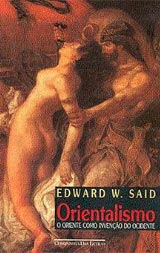


เอ็ดวาร์ด
ดับเบิลยู. ซาอิด ได้พูดถึงเรื่องราวเกี่ยวกับชีวิตของเขาและคอนราดเมื่อเร็วๆนี้
ณ ห้องสมุด New York Public Library. สำนักพิมพ์ LRB จะตีพิมพ์งานเขียนเกี่ยวกับชีวิต
และประสบการรณ์ความทรงจำของเขาเป็นบทๆ เมื่อมันใกล้จะเสร็จสมบูรณ์ (1997-99)
(ต้นฉบับ) http://carmen.artsci.washington.edu/panop/author_S.htm#SAID
Edward W. Said เป็นหนึ่งในบรรดาผู้ก่อตั้งความรู้ว่าด้วยเรื่อง post-colonial studies (หลังอาณานิคมศึกษา) - ตัวมันเองวางอยู่บนพื้นฐานทฤษฎีวัฒนธรรมฝรั่งเศสอย่างหนักแน่น - Said เป็นที่รู้จักอย่างดีสำหรับงานเขียนในเรื่อง Orientalism และแนวความคิดต่างเกี่ยวกับ the Orient (ตะวันออก) ในฐานะวาทกรรมเฉพาะอันหนึ่ง ที่ได้รับการสร้างขึ้นมาโดยโลกตะวันตก. หนังสือในปี ค.ศ. 1978 ที่มีอิทธิพลอย่างกว้างขวางของ Said เรื่อง Orientalism ยืนหยัดอยู่ได้ในฐานะที่เป็นหนังสือสำคัญของทฤษฎีหลังอาณานิคม...
เพื่อนของผมคนหนึ่งที่สอนอยู่ที่โคลัมเบียอยู่แล้ว ภายหลังได้บอกกับผมว่า เมื่อผมจะได้รับการว่าจ้างให้ทำการสอน ณ ที่นั้นผมได้รับการอธิบายให้กับภาควิชาที่ผมจะบรรจุเข้าทำการสอน ในฐานะ "ยิวแห่งอเล็กซานเดรียน"(Alexandrian Jew)ผมจำได้ว่าเป็นความรู้สึกอันหนึ่งของการได้รับการยอมรับ และแสดงความนับถือ...





มหาวิทยาลัยเที่ยงคืน
กลางวันเรามองเห็นอะไรได้ชัดเจน
แต่กลางคืนเราต้องอาศัยจินตนาการ
Website ของมหาวิทยาลัยเที่ยงคืน
สร้างขึ้นมาเพื่อผู้สนใจในการศึกษา
โดยไม่จำกัดคุณวุฒิ
สนใจสมัครเป็นสมาชิก
กรุณาคลิกที่ปุ่ม member page
ส่วนผู้ที่ต้องการดูหัวข้อบทความ
ทั้งหมด ที่มีบริการอยู่ขณะนี้
กรุณาคลิกที่ปุ่ม contents page
และผู้ที่ต้องการแสดงความคิดเห็น
หรือประกาศข่าว
กรุณาคลิกที่ปุ่ม webboard
หากต้องการติดต่อกับ
มหาวิทยาลัยเที่ยงคืน
ส่ง mail ตามที่อยู่ข้างล่างนี้
(midnightuniv(at)yahoo.com)
บทความลำดับที่ 146 เผยแพร่ครั้งแรก วันที่ 5 มกราคม 2545 (ความยาวประมาณ 1 หน้ากระดาษ A4)
กุนเธอร์อยู่กับการเนรเทศ เขาอยู่กับคนกลุ่มใหญ่ หรือกับตัวเขาเอง เมื่อคืนเขาหลับและฝัน เขาเห็นตัวเขาเองวิ่งบนถนน มีคนรูปร่างใหญ่วิ่งตามเขามาจากข้างหลัง เขาเหนื่อยจนจะขาดใจ แล้วก็มีความฝันใหม่ เขาเห็นตัวเองได้รับรางวัลนักประพันธ์ มีผู้หญิงสวย แต่งตัวหรูหราติดตามเขา เขาเหนื่อยจนจะขาดใจ แล้วก็มีความฝันใหม่ผุดขึ้นมาอีก เขาเห็นตัวเขาเองนั่งจมอยู่กลางกองจดหมาย จดหมายฉบับหนึ่งพูดว่า หวังให้ท่านช่วยเหลือผมให้เป็นนักประพันธ์ใหญ่อย่างท่าน ผมได้สอดบทประพันธ์ของผมมาให้ท่านตรวจ กรุณาตรวจมัน และส่งคืนให้ผมที่บ้าน
เขาถอนหายใจ เขาลุกขึ้นเดินตรงไปมองออกไปนอกหน้าต่าง เขาเห็นทะเลและชายหาด ความคิดไหลออกมาจากหัวของเขา ถ้าไม่มีจดหมาย พวกนี้ ฉันจะได้ไปเดินแล้ว เขาถอนหายใจ กลับมานั่งบนเก้าอี้เดิม ยื่นมือขวาหยิบจดหมายใหม่ บัตรเชิญให้ไปเป็นประธานเปิดงานแสดงวรรณกรรม เขาโยนมันทิ้งลงไปในตะกร้า แล้วเปลี่ยนใจ ใช้มือล้วงเอาขึ้นมาวางบนโต๊ะในตะแกรง อย่างคิดคำนึง ถ้าฉันไม่ไป ถอนหายใจแล้วเปิดจดหมายใหม่ เชิญร่วมงานเลี้ยงกับผู้ปกครองระดับสูง แสงกลมเหลืองสว่างขึ้นในตา เขาฝันอีกครั้ง เขานั่งคนเดียวนิ่งสนิทแต่ใจร้อนในสวนสาธารณะ ติ๊กต๊อก เงียบ เงียบ คนอยู่ไหน เขาลุกขึ้น เดินออกอย่างรีบเร่ง เกือบวิ่งเพื่อไปอยู่กลางคนกลุ่มใหญ่ เขาเห็นตัวเขาเอง วิ่งบนถนน มีคนรูปร่างใหญ่วิ่งตามเขามาจากข้างหลัง เขาเหนื่อยจนจะขาดใจ แล้วก็มีความฝันใหม่ เขาเห็นตัวเองได้รับรางวัลนักประพันธ์ มีคนหน้าสวยมาล้อมรอบ .
กุนเธอร์อยู่กับการเนรเทศ เขาอยู่กับคนกลุ่มใหญ่หรือตัวเขาเอง เช้านี้เขาตื่นขึ้นและเขาแต่งตัวไปงานแสดงวรรณกรรม เขากำลังมีธุระผูกหูกระต่าย เสียงผู้ประกาศวิทยุอ่านประวัติของใครคนหนึ่ง
"นี่คือหน้าที่หันออกสู่แสงสว่าง หน้าที่เขาแสดงออกต่อสาธารณชน แต่หน้าที่หันดูตัวเองนั้นซับซ้อนและเลือนลางอยู่ในเงามืดแห่งจิตใจของเขาเอง ตัวตนที่แท้จริงของเขาหมกลึกอยู่ในความขี้อายและเก็บตัว (ประวัติบุคคลที่มีรายละเอียดน้อยที่สุดที่เขาเคยเขียน คือประวัติของเขาเอง) และไม่มีอะไรมากไปกว่าความถ่อมตัวเกี่ยวกับพรสวรรค์ของเขา ด้านหนึ่งของเขาเกลียดชังการสรรเสริญเยินยอที่แซ่ซ้องอยู่รอบตัวไม่ว่าจะย่างกรายไปที่ใดก็ตาม เขาเบื่อหน่ายจดหมายที่หลั่งไหลมาจากทุกสารทิศ แต่อีกด้านหนึ่งของเขาไม่กล้าที่จะปฏิเสธคำเชิญ งานวรรณกรรม การเดินทางไปปรากฏกายในที่ต่างๆนอกประเทศ หรือคำร้องขอความช่วยเหลือจากนักเขียนที่ยังไปไม่ถึงดวงดาว เขาพร่ำพูดถึงความต้องการของตัวเอง- ความสงบสันโดษ แต่เมื่อใดก็ตามที่เขาพบมัน มิพักที่ความเบื่อหน่ายและความหดหู่กลับเข้าครอบงำเขาอย่างรวดเร็ว ในช่วงเวลาสุดท้ายที่เขาใช้ชีวิตของผู้ถูกเนรเทศในต่างแดน เขาใช้สรรพนามแทนตัวว่า"ยิวพเนจร" แต่อันที่จริง สำหรับเวลาส่วนใหญ่ของชีวิต การ"ร่อนเร่ในต่างแดน" คือวิถีชีวิตที่เขารักและเลือกแล้ว สิ่งที่เขาแสดงออกและสิ่งที่เป็น"ตัวจริง"ของเขานั้น ต่างกันราวฟ้ากับดิน ความสิ้นหวังอันดำดิ่งที่ผลักดันชีวิตของเขาไปสู่จุดจบดำรงอยู่แล้วเบื้องหลังฉากในช่วงนี้"
เช้านี้ กุนเธอร์มีธุระอยู่กับการผูกหูกระต่าย และค่อยๆหันปลายกระบอกปืนพกให้จ่อตรงกับขมับด้านขวาของเขา .
"ฑีฆพัฐสร์" แปล จากเรื่อง "Gunther" ประพันธ์โดย "Abba Kovnan"
ไปหน้าแรกของมหาวิทยาลัยเที่ยงคืน I สมัครสมาชิก I สารบัญเนื้อหา I webboard
e-mail : midnightuniv(at)yahoo.com
หากประสบปัญหาการส่ง
e-mail ถึงมหาวิทยาลัยเที่ยงคืนจากเดิม
midnightuniv(at)yahoo.com
ให้ส่งไปที่ใหม่คือ
midnight2545(at)yahoo.com
มหาวิทยาลัยเที่ยงคืนจะได้รับจดหมายเหมือนเดิม
Between
Worlds
Edward Said makes sense of his life
In the first book I wrote, Joseph Conrad and the Fiction of Autobiography, published more than thirty years ago, and then in an essay called 'Reflections on Exile' that appeared in 1984, I used Conrad as an example of someone whose life and work seemed to typify the fate of the wanderer who becomes an accomplished writer in an acquired language, but can never shake off his sense of alienation from his new - that is, acquired - and, in Conrad's rather special case, admired home. His friends all said of Conrad that he was very contented with the idea of being English, even though he never lost his heavy Polish accent and his quite peculiar moodiness, which was thought to be very un-English. Yet the moment one enters his writing the aura of dislocation, instability and strangeness is unmistakable. No one could represent the fate of lostness and disorientation better than he did, and no one was more ironic about the effort of trying to replace that condition with new arrangements and accommodations - which invariably lured one into further traps, such as those Lord Jim encounters when he starts life again on his little island. Marlow enters the heart of darkness to discover that Kurtz was not only there before him but is also incapable of telling him the whole truth; so that, in narrating his own experiences, Marlow cannot be as exact as he would have liked, and ends up producing approximations and even falsehoods of which both he and his listeners seem quite aware.
Only well after his death did Conrad's critics try to reconstruct what has been called his Polish background, very little of which had found its way directly into his fiction. But the rather elusive meaning of his writing is not so easily supplied, for even if we find out a lot about his Polish experiences, friends and relatives, that information will not of itself settle the core of restlessness and unease that his work relentlessly circles. Eventually we realise that the work is actually constituted by the experience of exile or alienation that cannot ever be rectified. No matter how perfectly he is able to express something, the result always seems to him an approximation to what he had wanted to say, and to have been said too late, past the point where the saying of it might have been helpful. 'Amy Foster', the most desolate of his stories, is about a young man from Eastern Europe, shipwrecked off the English coast on his way to America, who ends up as the husband of the affectionate but inarticulate Amy Foster. The man remains a foreigner, never learns the language, and even after he and Amy have a child cannot become a part of the very family he has created with her. When he is near death and babbling deliriously in a strange language, Amy snatches their child from him, abandoning him to his final sorrow. Like so many of Conrad's fictions, the story is narrated by a sympathetic figure, a doctor who is acquainted with the pair, but even he cannot redeem the young man's isolation, although Conrad teasingly makes the reader feel that he might have been able to. It is difficult to read 'Amy Foster' without thinking that Conrad must have feared dying a similar death, inconsolable, alone, talking away in a language no one could understand. (detail...)

